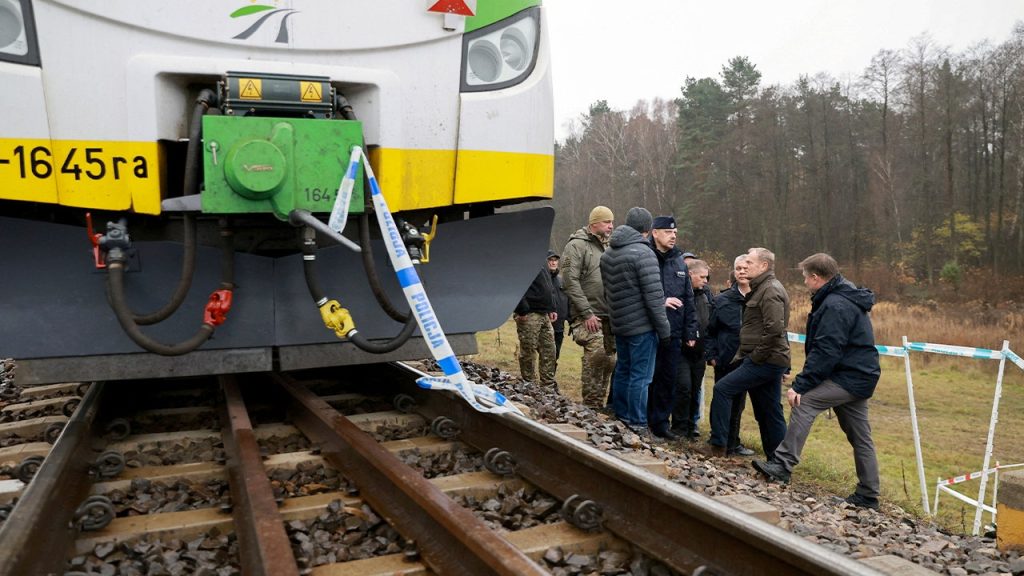Russia Accused of Railway Sabotage in Poland: An Act of Destabilization
Poland’s special services minister’s spokesperson, Jacek Dobrzyński, has publicly accused Russian intelligence of orchestrating a railway explosion that destroyed a critical track used for delivering aid to Ukraine. Speaking with conviction at a recent press conference, Dobrzyński stated that “everything indicates” the sabotage was directed by “special services from the East,” referring to what Polish authorities are now confidently labeling a terrorist attack. This serious accusation comes at a time of heightened tensions between NATO countries and Russia, with Poland serving as a crucial supply line for Western support to Ukraine in its ongoing conflict with Russia.
The incident involved an explosion that destroyed a section of the Warsaw-Lublin railway line, while another stretch further south was damaged in what appears to be a coordinated act of sabotage. These railway lines represent vital infrastructure for Poland and serve as essential supply routes for humanitarian and military aid flowing into Ukraine from Western allies. Polish Prime Minister Donald Tusk addressed the situation with gravity, describing it as an “unprecedented act of sabotage” and vowing to identify those responsible. “The explosion of an explosive device destroyed the railway track. Emergency services and the prosecutor’s office are working at the scene,” Tusk noted in a statement posted on social media, highlighting the government’s immediate response to the threat.
While providing these serious accusations, Polish officials remain cautious about sharing details of their ongoing investigation. Dobrzyński explained this discretion is strategic, noting, “The Russian services would very much want to have this information: where our officers are or in which direction they are heading.” This careful approach underscores the sensitive nature of counter-intelligence work and the ongoing security concerns Poland faces as a frontline NATO member supporting Ukraine. In response to these developments, Poland’s National Security Committee convened with military commanders, intelligence chiefs, and the president’s representative to discuss the incidents and formulate an appropriate response to what they view as a direct attack on Polish sovereignty.
This railway sabotage doesn’t exist in isolation but rather forms part of a pattern of security incidents in Eastern Europe that have raised alarm among NATO members. Just weeks earlier, Poland reported airspace incursions involving Russian drones, while Estonia faced a violation when three Russian MiG-31 fighter jets crossed into their territory before being intercepted by NATO aircraft. These provocations suggest an escalating campaign of hybrid warfare tactics being deployed by Russia against NATO’s eastern flank – combining conventional military intimidation with covert sabotage operations designed to destabilize support for Ukraine and test alliance resolve.
The timing of these incidents appears deliberate, coming as Ukraine continues to rely heavily on Western support flowing through Poland and other neighboring countries. By targeting critical infrastructure used for aid delivery, the perpetrators seem intent on disrupting the supply lines that have been crucial to Ukraine’s resistance efforts. This attack on Polish soil represents a significant escalation, as it constitutes direct interference with NATO territory rather than limiting hostile actions to Ukraine itself. The Polish government’s swift and serious response, including convening high-level security meetings and publicly attributing blame to Russia, demonstrates how seriously Warsaw views this threat to national security.
The international community now watches closely to see how NATO will respond to these provocations occurring on alliance territory. Poland’s direct accusation against Russian intelligence services escalates diplomatic tensions but also signals Warsaw’s determination not to be intimidated. As investigations continue, the incidents serve as a stark reminder of the broader geopolitical struggle unfolding across Eastern Europe, where infrastructure security has become a critical battleground in the larger conflict between Russia and Western-allied nations. This railway sabotage, if conclusively linked to Russian intelligence, would represent not just an attack on Polish infrastructure but a direct challenge to NATO’s collective security framework, potentially demanding a coordinated alliance response beyond individual national reactions.


